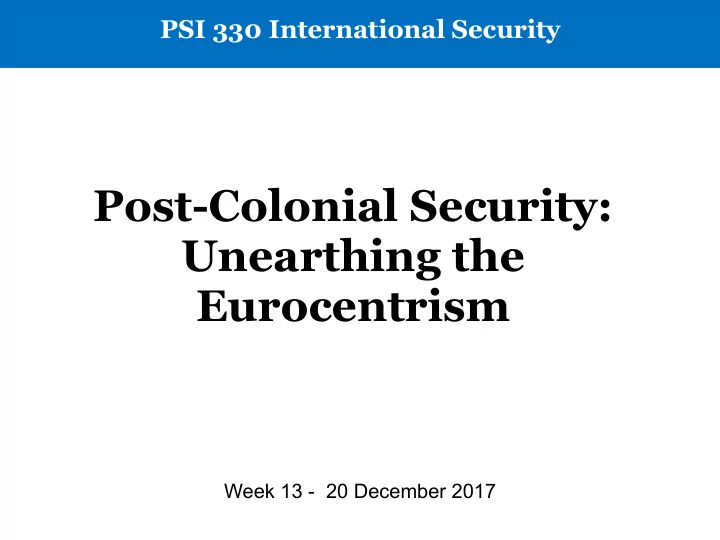

PSI 330 International Security Post-Colonial Security: Unearthing the Eurocentrism Week 13 - 20 December 2017
What is Eurocentrism? • Eurocentrism is a complex idea but at its core is the assumption of European centrality in the human past and present. • Def”n:as a thought style in which the assessment and evaluation of non- European societies is couched in terms of the cultural assumptions and biases of Europeans and, by extension, the West. • The subject–object dichotomy • Europeans in the foreground • Europeans as originators • The imposition of European categories and concepts • Belief in the objective superiority of European civilization
Eurocentrism in Security Studies • The Eurocentrism of conventional security studies takes different forms across the theoretic perspectives that constitute the field • Realism: Focus on great power relations • Liberalism: Liberal norms are based on the European histories and intellectual trajectories • Constructivism: attempts to make sense on international orders through the eyes of Western philosophy • Critical Security Studies: Emancipation is based on Western philosophy • Commonly accepted the unit of analysis, state, is also Eurocentric.
Eurocentrism in Security Studies • Two Main Problems: • Focus on Great Power Relations • Regarding the Weak and Powerless as Marginal Elements of World Politics
Great Power Relations • A specific set of historical periodizations and spatial assumptions • By historical periodizations we mean the taken-for-granted chronologies of key actors, central processes and significant events that structure the field. • By spatial assumptions, we mean the frameworks that organize the world in spatial terms and locate these actors, processes, and events, both in relation to each other and to world politics more generally • Conventional security studies, the core of IR, is also shaped by the politics of a particular time and place. • To the extent that world politics is seen as taking place elsewhere, as in the Third World during the Cold War, it is derivative of European developments
The Weak and Powerless as Marginal Elements • “the strong do what they have the power to do and the weak accept what they have to accept” - Thucydides • Waltz: IR, therefore security studies, are rightly Eurocentric. • Eurocentric accounts of great-power competition tend to take the weak – the ‘natives’, the colonies, the periphery, the Third World, the global South – more or less for granted. • Shifting the attention to the ebb and flow of the social relations through which great powers are constituted, reproduced and transformed, the “weak” becomes important • The everywhere taken-for-granted assumption that it is the powerful, who have the right to bear arms.
Third World Security • The major characteristics of the concept of state or national security in Western states are, in the Third World, if not totally absent, so thoroughly diluted as to be hardly recognizable • External orientation • Strong linkage with systemic security • Binding ties with the security of the two major blocs (became defunct after the Cold War) • The source of security threats to the Third World emanates from inside
Third World Security • Sources of difference between the West and Third World • The history of state formation in the Third World as compared to its counterpart • The pattern of elite recruitment and regime establishment and maintenance in the Third World as compared to the same process in the developed states. • State Structures • West: Unconditional legitimacy + strong & cohesive state structures = strong state • Third World: No unconditional legitimacy + weak state structures = weak state
Third World Security • How security problems are framed: • Developed country security = international security • Third World security = Third World problem (except for oil producing countries) • War between the Third world is perceived as permissible, as long as they do not draw a major power • Secondary factor: superpowers benefit from Third World conflicts
Third World Security • Some benefits: • Keep the arms industry of the developed world in business, pay for a substantial proportion of R&D investments, and help recycle petrodollars into developed economies • Provide convenient testing grounds for new weapons systems which can then be improved upon in the light of combat experience • Provide relatively safe instrument for testing the limits of adversary’s tolerance and a rough and ready measure of its ‘will’ to resist political and military encroachments • Provide opportunities for ‘linkage’ between issues, thereby allowing a superpower which finds itself in a disadvantageous position in one context to choose another point, where it is more favorably placed, to put pressure on its adversary • Provide the superpowers with the opportunity to demonstrate their ‘credibility’ to those allies which are considered vital to the superpowers’ own security • Provide one way of ensuring access to strategic raw materials, such as oil and minerals, which are considered essential for the security of the superpowers and their vital allies.
Discussion • Cuban Missile Crisis • the Holocaust • Al-Queda • World War 2 • Indian Military (under British rule)
Recommend
More recommend